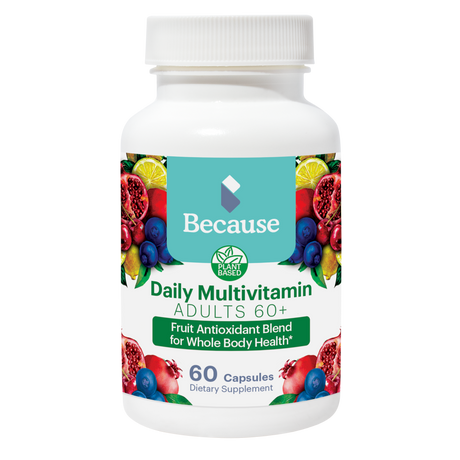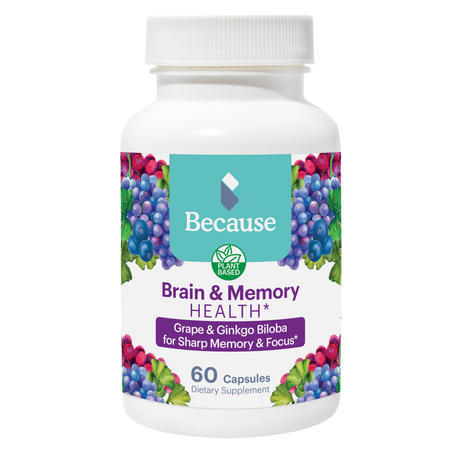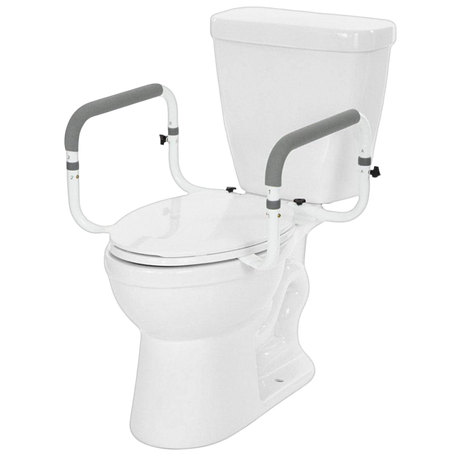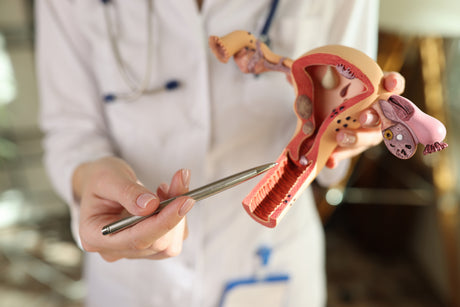Menopause brings about hormonal fluctuations that can impact everything from metabolism to bladder health to mood, making it crucial to prioritize nutrition for overall well-being. In this blog, we'll explore the key nutrients menopausal women need, dietary strategies to alleviate symptoms, and lifestyle adjustments for navigating this transition with grace and vitality. Whether you're seeking relief from hot flashes or aiming to support bone health, our expert insights and practical tips will empower you on your journey to optimal health during menopause.
Understanding Menopause and Its Impact on Nutrition
Nutrition has a complex role to play during menopause. Understanding how hormonal shifts combined with dietary needs interact is fundamental for crafting a diet plan that supports your health and well-being through menopause and beyond.
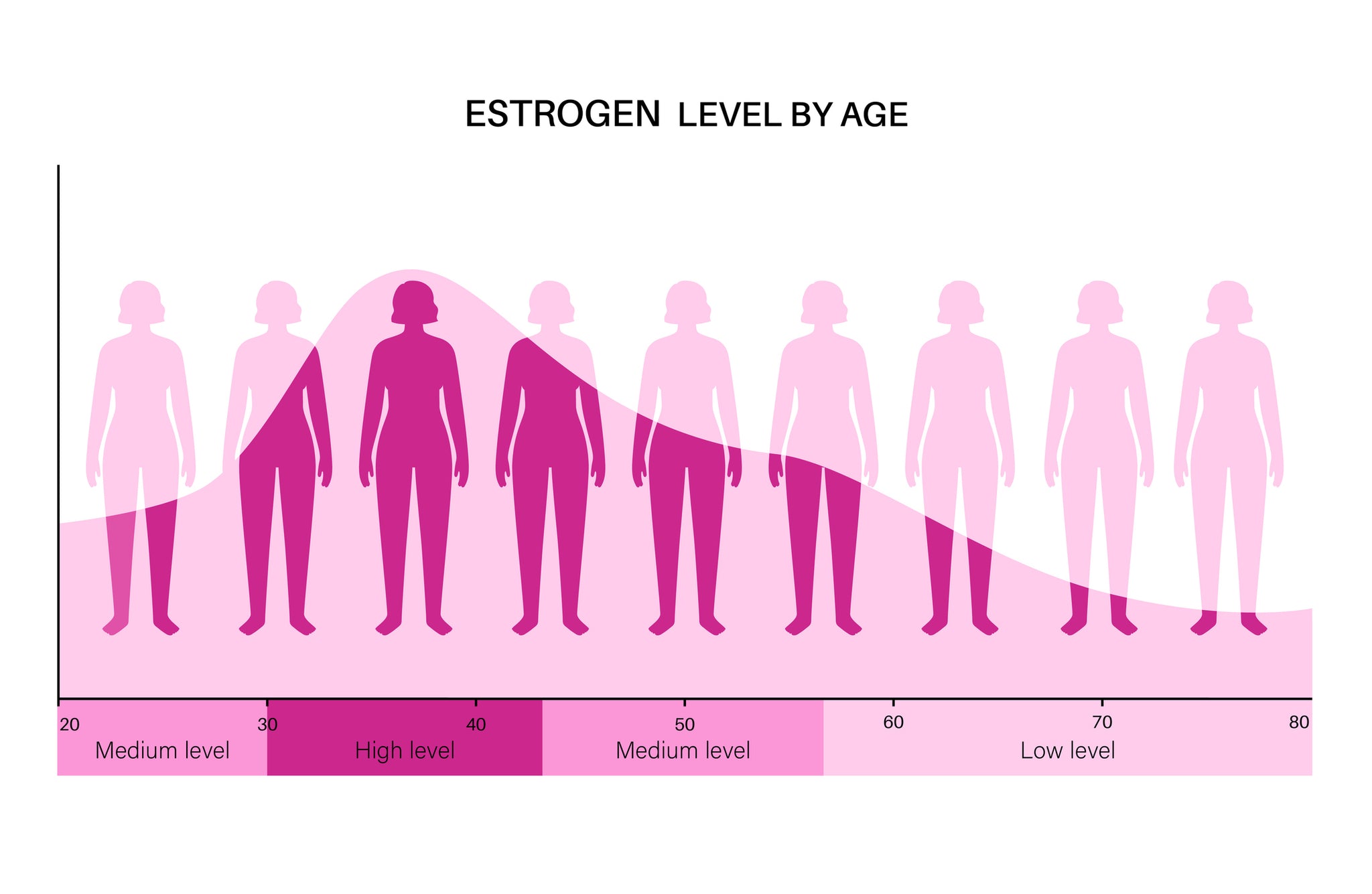
Hormonal Changes and Metabolism
During menopause, hormonal fluctuations, particularly decreases in estrogen, can influence metabolism in various ways. These changes may lead to alterations in fat distribution, decreased muscle mass, and a slower metabolic rate, affecting weight management and overall energy levels.
The Role of Nutrition in Managing Menopausal Symptoms
Nutrition plays a pivotal role in managing menopausal symptoms, offering a holistic approach to alleviate discomfort and support overall well-being. Certain nutrients, such as calcium and phytoestrogens, can help mitigate bone loss and hormonal imbalances, while others, like omega-3 fatty acids and antioxidants, combat inflammation and oxidative stress, easing symptoms like hot flashes and mood swings. By adopting a balanced diet rich in these key nutrients and avoiding triggers like caffeine and processed foods, women can effectively navigate the challenges of menopause and promote long-term health and vitality.

Common Nutritional Challenges During Menopause
During menopause, women may face several common nutritional challenges due to hormonal changes and aging-related factors. These challenges often include:
- Bone Health: Decreased estrogen levels can lead to bone loss, increasing the risk of osteoporosis. Adequate intake of calcium, vitamin D, magnesium, and other bone-supporting nutrients is crucial to maintain bone density and reduce fracture risk.
- Weight Management: Metabolic changes and hormonal fluctuations during menopause can make weight management more challenging. Slower metabolism and changes in fat distribution may contribute to weight gain, particularly around the abdomen. Emphasizing a balanced diet with proper portion control and regular physical activity can help manage weight effectively.
- Heart Health: Estrogen has a protective effect on the cardiovascular system, and its decline during menopause may increase the risk of heart disease. Adopting a heart-healthy diet rich in fruits, vegetables, whole grains, lean proteins, and healthy fats can help mitigate this risk by reducing inflammation and supporting cardiovascular function.
- Mood and Energy Levels: Hormonal fluctuations during menopause can impact mood, energy levels, and cognitive function. Nutritional imbalances, such as inadequate intake of vitamins and minerals, may exacerbate these symptoms. Consuming nutrient-dense foods and maintaining stable blood sugar levels through regular meals and snacks can help support mood stability and energy levels.
- Digestive Health: Changes in hormone levels can affect digestive function, leading to symptoms like bloating, constipation, or diarrhea. Increasing dietary fiber intake, staying hydrated, and incorporating probiotic-rich foods can promote digestive health and alleviate discomfort.
Addressing these nutritional challenges through a balanced diet, supplemented with targeted nutrients as needed, can help women navigate menopause with greater ease and maintain optimal health and well-being.
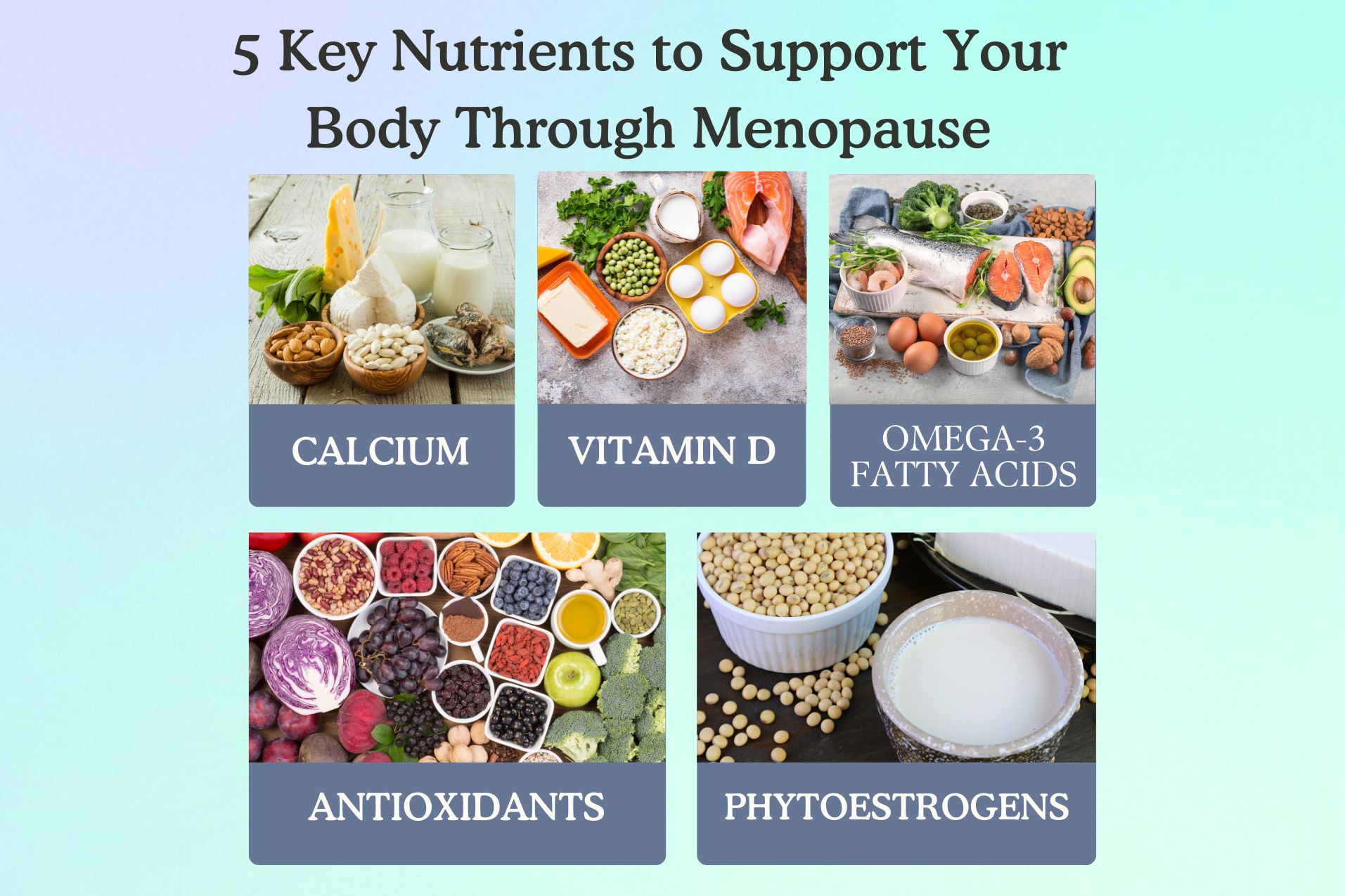
Key Nutrients for Menopausal Women
In this section, we explore the essential nutrients that play a critical role in supporting women's health during menopause. From calcium and vitamin D for maintaining bone density to omega-3 fatty acids for reducing inflammation, understanding these key nutrients is paramount for addressing the unique nutritional needs of menopausal women. Join us as we delve into the science behind these nutrients and learn how to incorporate them into a balanced diet for optimal health during this transformative phase of life.
Calcium and Vitamin D
Calcium and vitamin D are essential nutrients for menopausal women, crucial for maintaining strong bones and reducing the risk of osteoporosis. During menopause, declining estrogen levels can accelerate bone loss, making adequate calcium intake vital for preserving bone density. Vitamin D facilitates calcium absorption, further supporting bone health, while also playing a role in immune function and mood regulation, making it indispensable during this life stage.
Omega-3 Fatty Acid
Omega-3 fatty acids are essential for menopausal women due to their anti-inflammatory properties, which can help alleviate symptoms such as joint pain and hot flashes. Additionally, omega-3s support heart health by reducing the risk of cardiovascular disease, a concern that becomes more pronounced after menopause. Incorporating sources of omega-3 fatty acids, such as fatty fish, flaxseeds, and walnuts, into the diet can contribute to overall well-being during this transitional phase.
Phytoestrogens
Phytoestrogens, found in plant-based foods like soybeans, flaxseeds, and legumes, are essential for menopausal women as they can help alleviate symptoms associated with declining estrogen levels. These compounds have a weak estrogenic effect, which may help to rebalance hormone levels and reduce the frequency and severity of hot flashes and night sweats. Incorporating phytoestrogen-rich foods into the diet can offer natural support for hormonal balance and promote overall well-being during menopause.
Antioxidants
Antioxidants are essential for menopausal women as they help combat oxidative stress and inflammation, which can exacerbate symptoms like hot flashes and mood swings. By neutralizing free radicals in the body, antioxidants support overall health and may reduce the risk of chronic diseases such as heart disease and cancer, which become more prevalent after menopause. Including a variety of antioxidant-rich foods such as berries, leafy greens, and nuts in the diet can provide protection against cellular damage and promote vitality during this stage of life.
Creating a Balanced Menopause Diet Plan
In this section, we delve into crafting a balanced menopause diet plan tailored to address the unique nutritional needs of women during this transformative phase. From emphasizing whole foods rich in essential nutrients to incorporating mindful eating habits, we explore practical strategies to support health and well-being through diet during menopause.
Emphasizing Whole Foods: Fruits, Vegetables, and Whole Grains
Emphasizing whole foods such as fruits, vegetables, and whole grains is crucial during menopause as these nutrient-dense options provide essential vitamins, minerals, and fiber to support overall health. They also help stabilize blood sugar levels, promote satiety, and reduce the risk of chronic diseases like heart disease and diabetes, which become more prevalent with age. Incorporating a variety of colorful fruits and vegetables along with whole grains into the diet can contribute to optimal nutrition and well-being during this transitional phase of life.
Importance of Protein: Lean Meats, Fish, Legumes
Protein is important during menopause as it plays a crucial role in supporting muscle mass, which tends to decline with age and hormonal changes. Adequate protein intake can help maintain muscle strength and promote overall physical function, contributing to a healthy and active lifestyle during this phase of life. Additionally, protein-rich foods can help regulate appetite, support weight management, and provide essential amino acids necessary for various bodily functions.
Meal Timing and Portion Control: Managing Weight and Energy Levels
Meal timing and portion control are important during menopause as they can help regulate blood sugar levels, manage weight, and support overall energy balance. Eating regular, balanced meals and snacks throughout the day can prevent fluctuations in blood sugar, which can exacerbate symptoms like mood swings and fatigue. Additionally, practicing portion control can help prevent overeating and promote a healthy relationship with food, contributing to long-term well-being during this transitional phase of life.
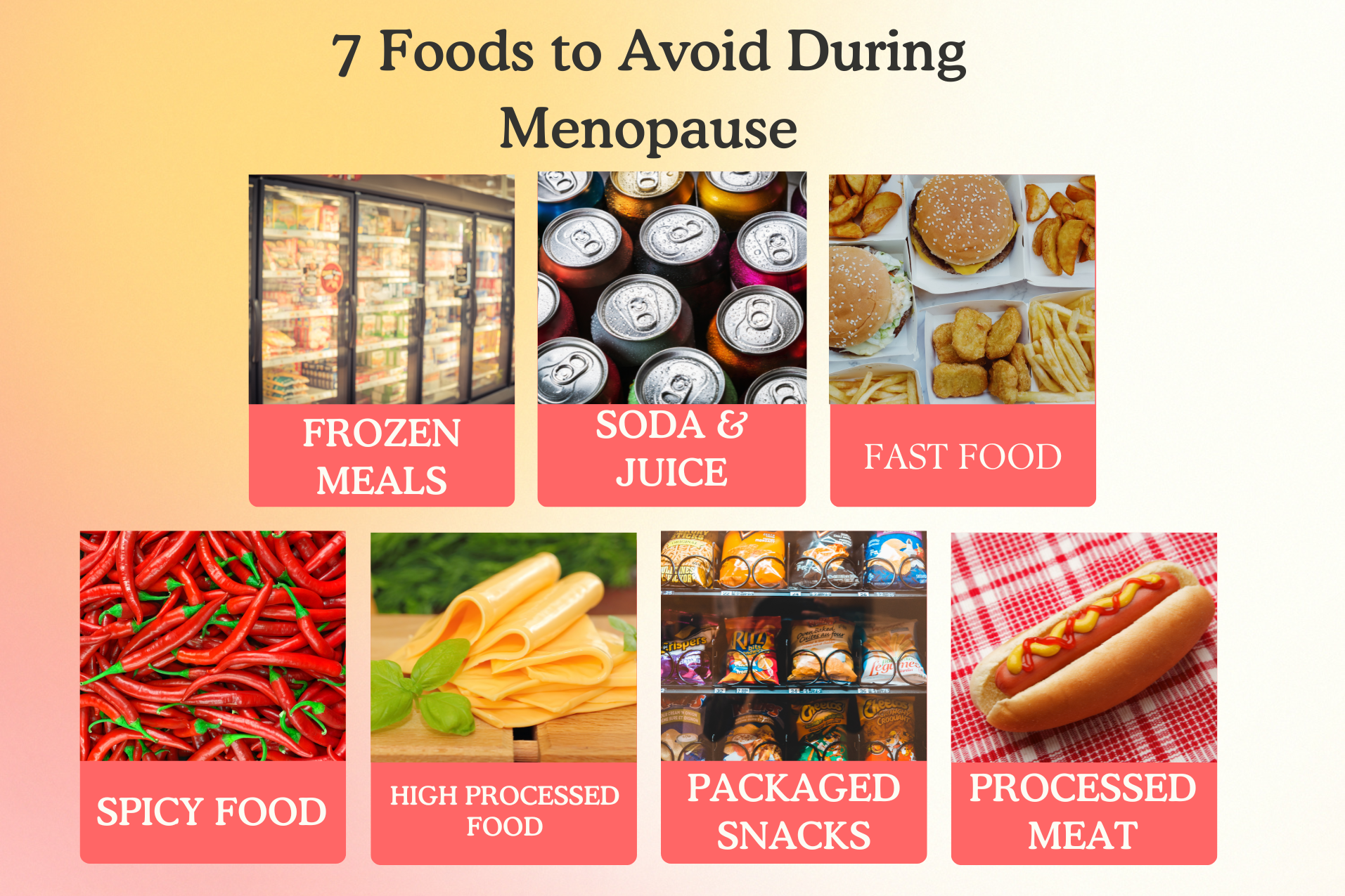
Foods to Limit or Avoid During Menopause
In this section, we explore dietary factors to limit or avoid during menopause to promote optimal health and alleviate symptoms. By understanding which foods may exacerbate common menopausal issues such as hot flashes and mood swings, we can make informed choices to support overall well-being during this transformative phase of life.
Foods that Impact Hormonal Balance
Highly processed foods can affect hormonal balance, potentially exacerbating symptoms during menopause. These include:
- Sugary breakfast cereals
- Packaged snacks like chips, cookies, and candy bars
- Frozen meals and pre-packaged dinners
- Sugary beverages such as soda, sweetened fruit juices, and energy drinks
- Instant noodles and flavored pasta dishes
- Processed meats like sausages, hot dogs, and deli meats
- Fast food items like burgers, fries, and fried chicken
- Packaged baked goods like cakes, pastries, and muffins
Foods that Contribute to Hot Flashes and Sleep Issues
Foods that affect hot flashes and sleep during menopause can exacerbate symptoms. Here are some examples:
- Spicy foods: Spicy foods can trigger hot flashes in some individuals by increasing body temperature.
- Caffeine: Consuming caffeine close to bedtime can disrupt sleep patterns and worsen hot flashes.
- Alcohol: Alcohol can increase body temperature and disrupt sleep, potentially exacerbating hot flashes and night sweats.
- Individual Sensitivities: Paying attention to individual sensitivities: Certain foods may trigger hot flashes or disrupt sleep in some individuals but not others. It's essential to pay attention to how specific foods affect your symptoms and adjust your diet accordingly.
Foods that Can Alter Blood Pressure
Here are some examples of foods that negatively impact blood pressure:
- Processed foods: Processed foods such as canned soups, packaged snacks, and processed meats are often high in sodium, which can lead to high blood pressure.
- Salty snacks: Foods like chips, pretzels, and salted nuts are high in sodium and can contribute to elevated blood pressure levels.
- Fast food: Fast food items like burgers, fries, and pizza are typically high in sodium and unhealthy fats, both of which can increase blood pressure.
Foods that Decrease Heart Health
Foods that decrease heart health are typically high in unhealthy fats, sodium, and added sugars, and they lack essential nutrients. These include:
- Deli meats, sausages, hot dogs
- Fried foods
- Packaged snacks
- Soda or fruit juices
- Highly processed foods like canned soups, frozen meals, and fast food
- Fatty meats
- Full-fat dairy
Incorporating Lifestyle Changes for Optimal Menopausal Health
In this section, we explore the importance of incorporating lifestyle changes to support optimal health during the menopausal transition. From regular exercise to stress management techniques, these lifestyle adjustments play a critical role in managing symptoms, promoting overall well-being, and navigating this transformative phase with resilience and vitality.
Regular Exercise: Supporting Bone Density and Mood
Regular exercise is crucial during menopause as it helps support bone density by stimulating bone growth and strengthening muscles, reducing the risk of osteoporosis and fractures. According to the American Academy of Orthopaedic Surgeons, exercise can increase bone density by 1-2% per year, significantly reducing the risk of fractures in postmenopausal women.
Additionally, physical activity plays a vital role in managing mood swings and promoting emotional well-being by releasing endorphins, reducing stress, and improving sleep quality. In fact, one study in the American Journal of Psychiatry found that regular exercise could prevent 12% of future cases of depression with just 1 hour of physical activity per week. Incorporating a variety of exercises, including weight-bearing exercises like walking or strength training, as well as activities like yoga, dancing, or swimming, can contribute to better bone health and a more positive outlook during this life stage.
Stress Management Techniques: Yoga, Meditation, Deep Breathing
Stress management techniques such as yoga, meditation, and deep breathing are essential for menopausal women, with studies showing significant benefits for both physical and mental well-being.
Quality Sleep: Importance and Tips for Better Sleep During Menopause
Quality sleep is paramount for menopausal women, as hormonal fluctuations can disrupt sleep patterns and exacerbate symptoms like hot flashes and mood swings. Research indicates that 42% of premenopausal. 47% of perimenopausal, and 60% of postmenopausal women experience sleep disturbances, emphasizing the importance of implementing strategies for better sleep hygiene. Incorporating practices such as maintaining a consistent sleep schedule, creating a relaxing bedtime routine, and optimizing sleep environment can improve sleep quality and duration, leading to enhanced overall well-being during this transformative phase.
Consulting with a Nutritionist or Healthcare Provider
In this section, we emphasize the importance of seeking professional guidance from a nutritionist or healthcare provider to address individual nutritional needs and optimize health outcomes during menopause. With personalized advice and tailored dietary plans, these experts can offer invaluable support in navigating the complexities of menopausal nutrition, ensuring a holistic approach to well-being during this transformative life stage.
Importance of Individualized Nutrition Plans
Individualized nutrition plans are essential during menopause as they take into account each person's unique health status, dietary preferences, and lifestyle factors. By tailoring dietary recommendations to address specific nutritional needs and health goals, individuals can optimize their diet to manage symptoms, support overall well-being, and reduce the risk of chronic diseases associated with this life stage. Consulting with a nutritionist or healthcare provider can help ensure that nutritional interventions are personalized and effective in promoting long-term health during menopause.
Integrating Supplements: Pros and Cons
Integrating supplements during menopause can offer additional support for addressing nutritional deficiencies or specific health concerns, but it's important to weigh the pros and cons. While supplements can provide targeted nutrients that may be lacking in the diet, excessive or unnecessary supplementation can lead to adverse effects and interactions with medications. Consulting with a healthcare provider or nutritionist can help determine the appropriate supplements and dosages based on individual needs and ensure safe and effective integration into a comprehensive menopausal health plan.
Sources:
Campbell, B. (2020, July). Exercise and Bone Health. OrthoInfo, https://orthoinfo.aaos.org/en/staying-healthy/exercise-and-bone-health/#:~:text=days%20each%20week.-,Adults,loading%20exercise%20isn't%20continued.
Harvey, S. B., Øverland, S., Hatch, S. L., Wessely, S., Mykletun, A., & Hotopf, M. (2018). Exercise and the Prevention of Depression: Results of the HUNT Cohort Study. American Journal of Psychiatry, 175(1), 28–36. https://doi.org/10.1176/appi.ajp.2017.16111223
Salari, N., Hasheminezhad, R., Hosseinian-Far, A., Rasoulpoor, S., Assefi, M., Nankali, S., Nankali, A., & Mohammadi, M. (2023). Global prevalence of sleep disorders during menopause: a meta-analysis. Sleep & breathing = Schlaf & Atmung, 27(5), 1883–1897. https://doi.org/10.1007/s11325-023-02793-5


